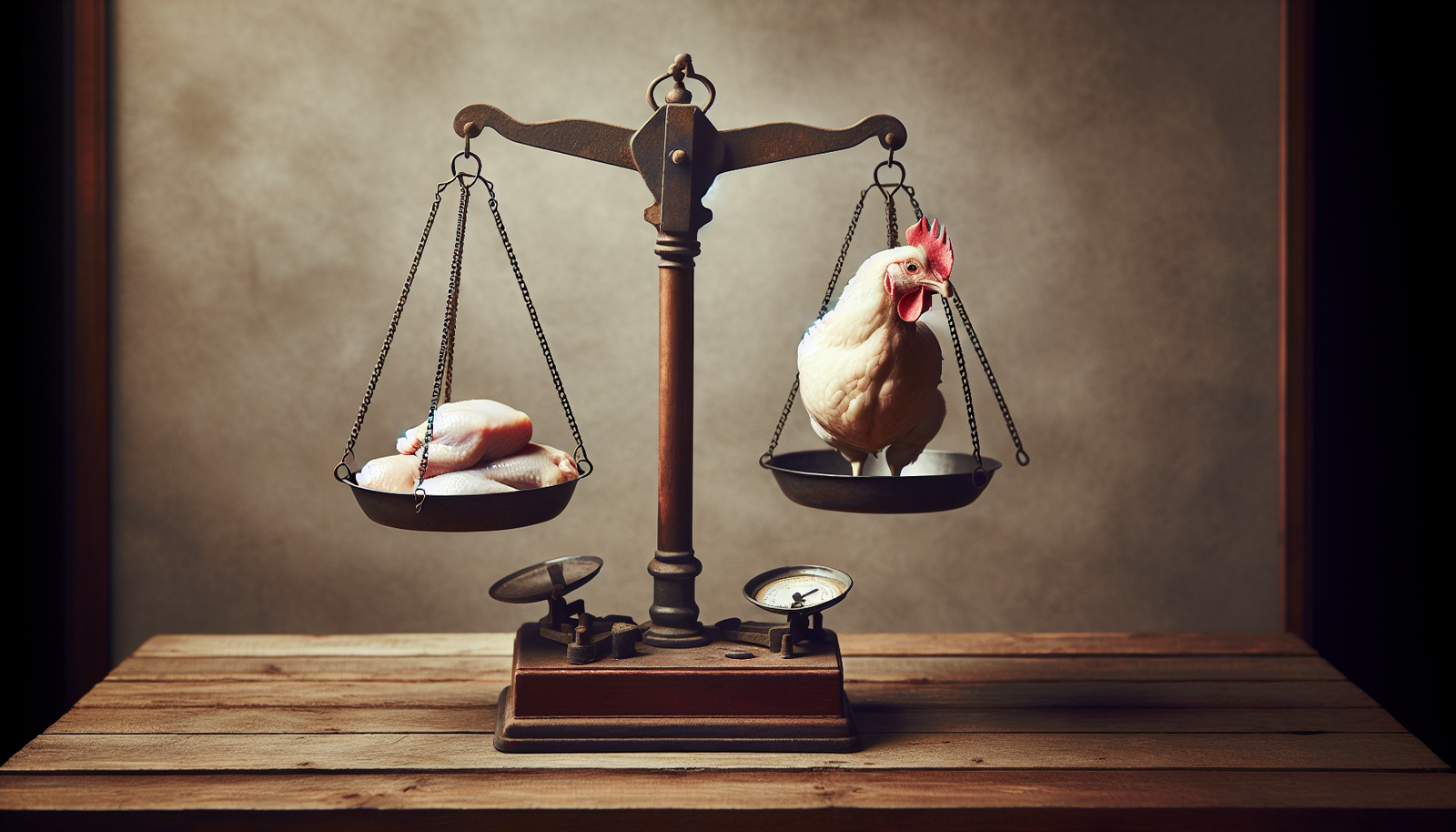Do you ever wonder why some chicken products are priced higher than others? Well, it turns out that ethical considerations play a significant role in the pricing of these products. From the conditions in which the chickens are raised to the sourcing of their feed, ethical concerns such as animal welfare, sustainability, and fair trade practices are being increasingly taken into account by both consumers and businesses. This article explores how these ethical considerations affect the pricing of chicken products, shedding light on the various factors that contribute to the final price tag.
The Cost of Organic Chicken
Higher Production Costs
When it comes to organic chicken, one of the main factors that contribute to its higher price is the higher production costs. Organic farming practices necessitate the use of organic feed, which tends to be more expensive compared to conventional feed options. Additionally, organic chicken farmers are required to invest in organic certification, which comes with its own set of costs. These additional expenses incurred in the production process naturally translate into higher prices for organic chicken products.
Certification and Compliance
In order to meet the standards and requirements of organic farming, chicken farmers must adhere to numerous regulations and obtain certification. This certification process involves thorough inspections and audits to ensure compliance with organic standards, contributing to the overall cost of production. Organic chicken farmers must invest not only in the initial certification process but also in maintaining and renewing their certification regularly. These additional costs incurred to meet the certification requirements contribute to the higher price of organic chicken.
Limited Supply and Increased Demand
The limited supply and increased demand for organic chicken also play a significant role in its higher pricing. Organic chicken production requires careful management and adherence to specific farming practices, which may lead to smaller scale production compared to conventional poultry farming. As a result, the supply of organic chicken is relatively limited. On the other hand, the demand for organic chicken has been steadily increasing as consumers become more conscious of their food choices. The combination of limited supply and increased demand puts upward pressure on prices, making organic chicken more expensive than conventionally produced alternatives.
Fair Trade Practices
Fair Wages for Farmers
One of the considerations impacting the pricing of chicken products is the commitment to fair trade practices. This encompasses the fair treatment of farmers and ensuring they receive adequate wages. Ethical chicken production aims to provide farmers with fair compensation for their work, enabling them to support their families and invest in their farms. However, the implementation of fair trade practices within the chicken industry entails additional costs, which inevitably contribute to the higher prices of ethically produced chicken products.
Improved Working Conditions
Ethical considerations also extend to the working conditions of farmers involved in chicken production. This involves ensuring safe and healthy working environments, providing necessary protective equipment, and addressing any labor-related issues promptly. Improved working conditions require investments in infrastructure, training, and resources, all of which add to the overall production costs. As a result, the emphasis on improved working conditions impacts the pricing of ethical chicken products.
Community Development and Support
Ethical chicken production focuses not only on fair wages and improved working conditions for farmers but also on community development and support. This includes initiatives aimed at enhancing education, healthcare, and overall well-being within farming communities. Such community development programs require financial investments, which are factored into the pricing of ethically produced chicken products. By contributing to the betterment of the communities, ethical chicken production aims to create a more sustainable and inclusive system, albeit at a higher cost.
Animal Welfare
Humane Farming Practices
Ethical considerations emphasize the importance of humane farming practices in chicken production. This includes providing chickens with an environment that allows for natural behaviors and minimizes stress. Ethical chicken farmers focus on creating living conditions that prioritize the welfare of the animals, such as providing ample space, access to sunlight, and the ability to express natural behaviors. These humane farming practices often demand additional investments, as they require more spacious housing systems and alterations to existing infrastructure. Consequently, the cost of implementing and maintaining such practices influences the pricing of ethically produced chicken products.
Cage-Free and Free-Range Systems
Another aspect of ethical chicken production involves offering chickens the freedom to move and roam. This is commonly achieved through cage-free and free-range systems, where chickens have the opportunity to move about and explore their surroundings. Enabling chickens to live in more natural environments requires changes in housing structures and the allocation of more space per bird. This transition to cage-free and free-range systems incurs higher costs, which are reflected in the price of chicken products produced under these ethical standards.
Higher Feed and Space Requirements
Ethical considerations regarding animal welfare impact the pricing of chicken products by necessitating higher feed and space requirements. Ensuring that chickens are raised in healthier and less stressful environments entails providing them with higher quality feed that meets specific nutritional standards. Additionally, providing more space per bird means lowering the stocking density to allow for better movement and reducing stress levels. However, these higher feed and space requirements entail increased costs for ethical chicken farmers, contributing to the higher prices of their products.
Sustainable Farming
Environmental Conservation Efforts
Sustainable farming practices in chicken production focus on minimizing the negative impact on the environment. This includes reducing the use of pesticides, fertilizers, and other chemicals, and implementing methods that preserve soil quality and biodiversity. Sustainable chicken farmers invest in techniques such as crop rotation, integrated pest management, and conservation tillage to promote environmental conservation. However, these alternative practices often require additional investments and management strategies, leading to higher production costs and impacting the pricing of sustainable chicken products.
Reduced Use of Chemicals
In line with environmental conservation, sustainable chicken farming aims to reduce the use of chemicals throughout the production process. This involves minimizing or eliminating the use of synthetic fertilizers, pesticides, and antibiotics. Adopting these practices requires alternative methods to maintain the health and well-being of the chickens, such as natural supplements, herbal remedies, and improved sanitation practices. The costs associated with sourcing and implementing these alternative approaches contribute to the higher prices of sustainable chicken products.
Innovative Farming Techniques
Sustainable chicken farming often involves the adoption of innovative farming techniques aimed at optimizing resource utilization and minimizing waste. This includes practices such as water recycling, energy-efficient infrastructure, and waste management systems. However, incorporating these innovative techniques necessitates additional investments in infrastructure, technology, and training. The costs associated with implementing and maintaining these techniques influence the pricing of sustainable chicken products, despite their positive impact on the environment.
Labor Standards
Health and Safety Regulations
Ethical considerations encompass the health and safety regulations for workers involved in chicken production. This includes providing a safe working environment, proper equipment, and training to prevent accidents and injuries. Implementing and maintaining health and safety standards demand financial investments, such as safety training programs, infrastructure improvements, and regular inspections. These additional costs incurred to ensure the well-being of workers contribute to the overall pricing of ethically produced chicken products.
Fair Treatment of Workers
Fair treatment of workers involves considerations such as providing fair compensation, reasonable working hours, and access to appropriate benefits and protections. This may include providing workers with health insurance, retirement plans, and opportunities for advancement. Ethical chicken production aims to foster a culture of fair treatment, prompting chicken farmers to make additional investments in employee benefits and support systems. The commitment to fair treatment impacts the pricing of ethical chicken products, as these costs are factored into the overall production expenses.
Eliminating Exploitative Practices
Ethical considerations in chicken production extend to eliminating exploitative practices, such as forced labor or unfair employment contracts. Ethical chicken farmers strive to ensure that workers are treated ethically and are not subject to any form of exploitation. This demand for fair and ethical practices involves thorough oversight, auditing, and monitoring to verify compliance. The expenses associated with implementing and maintaining these measures to eliminate exploitative practices impact the pricing of ethical chicken products.
Genetically Modified Organisms (GMOs)
Consumer Aversion to GMOs
Many consumers express aversion to genetically modified organisms (GMOs) in their food, including in chicken products. Ethical considerations take into account this consumer preference and sourcing chicken feed that is free from any genetically modified ingredients. However, securing non-GMO feed often incurs increased costs, as it can be more challenging to produce and source compared to conventional feed options. The additional expenses associated with non-GMO feed contribute to the higher prices of ethically produced chicken products.
Increased Costs for Non-GMO Feed
The demand for non-GMO feed increases its price, making it more costly for ethical chicken farmers. Non-GMO feed requires stricter controls in sourcing and production, as well as verification and testing for genetic modifications. Additionally, the limited supply of non-GMO feed further drives up its cost. These increased costs incurred by ethical chicken farmers ultimately influence the pricing of their products, as non-GMO feed is a fundamental aspect of meeting consumer expectations and ethical standards in chicken production.
Supply Chain Transparency and Tracking
Ensuring the absence of GMOs in the chicken production process necessitates improved supply chain transparency and tracking. Ethical chicken farmers need to accurately track the sourcing and handling of the feed throughout the supply chain to verify its non-GMO status. This involves additional administrative tasks, technology investments, and testing procedures. The efforts and investments required to maintain supply chain transparency and tracking impact the pricing of ethically produced chicken products, reflecting the added costs associated with verifying GMO-free feed.
Traceability and Food Safety
Stringent Quality Control Measures
Ethical considerations include stringent quality control measures to ensure the safety and integrity of chicken products. Traceability is a vital aspect of this, enabling the identification of the entire production and distribution process for each individual product. This requires investments in record-keeping, labeling systems, and monitoring processes. The implementation of stringent quality control measures adds to the production costs, consequently influencing the pricing of ethical chicken products.
Enhanced Supply Chain Transparency
Ethical chicken production emphasizes enhanced supply chain transparency to provide consumers with information about the origin, handling, and processing of the products they purchase. This involves investments in data management systems, documentation, and information-sharing platforms. By enabling consumers to make informed choices, the transparency in the supply chain adds value to ethical chicken products. However, these additional investments contribute to the higher prices of such products.
Reduced Risk of Food Contamination
With increased traceability and strict quality control measures, ethical chicken production aims to minimize the risk of food contamination. By closely monitoring the production process and implementing rigorous safety protocols, the chances of contaminated chicken products reaching consumers are reduced. However, these safety measures require investments in testing facilities, staff training, and regular audits. The costs associated with reducing the risk of food contamination impact the pricing of ethical chicken products.
Corporate Social Responsibility
Investment in Local Communities
Corporate social responsibility is a significant aspect of ethical chicken production, driving investments in local communities. Ethical chicken farmers strive to support local economies and enhance the socio-economic well-being of the communities they operate in. This may include sourcing supplies locally, providing employment opportunities, and investing in community development initiatives. However, these investments contribute to the overall production costs, influencing the pricing of ethically produced chicken products.
Philanthropic Initiatives
Ethical chicken production often involves philanthropic endeavors aimed at addressing social and environmental challenges. This may include supporting charitable organizations, funding education programs, or contributing to environmental conservation projects. These philanthropic initiatives require financial commitments from ethical chicken producers, which are incorporated into the pricing of their products. By contributing to positive change, ethical chicken production aims to make a difference beyond the scope of the product itself.
Sustainable and Ethical Practices
Ethical chicken producers strive to implement sustainable and ethical practices throughout their operations. This includes factors such as minimizing environmental impact, prioritizing animal welfare, and promoting fair labor practices. Investing in sustainable and ethical practices often incurs additional costs, as it requires capital investments, research, and ongoing efforts to continuously improve and innovate. The commitment to sustainable and ethical practices directly influences the pricing of ethical chicken products.
Consumer Preferences and Values
Growing Demand for Ethical Products
Consumer demand for ethical products, including chicken, has been steadily increasing. More and more individuals are actively seeking products that align with their personal values, such as animal welfare, environmental conservation, and fair trade. This growing demand for ethical chicken contributes to its higher pricing, as producers need to invest in meeting the expectations and preferences of these ethically conscious consumers.
Willingness to Pay a Premium
Ethical considerations often come with a willingness to pay a premium for products that meet certain ethical standards. Consumers who prioritize animal welfare, sustainable farming practices, and fair trade are often willing to pay more for chicken products that align with their values. The willingness to pay a premium reflects the added costs associated with producing chicken ethically and allows ethical chicken farmers to continue investing in these practices.
Influence on Pricing Strategies
Consumer preferences and values play a substantial role in shaping the pricing strategies of chicken products. Ethical considerations have a direct impact on the production costs, but they also influence how producers position and market their products. By emphasizing the ethical aspects and values that resonate with consumers, producers can justify higher prices and differentiate their products in the market. As a result, consumer preferences and values significantly influence the overall pricing of ethical chicken products.
Government Regulations
Subsidies and Incentives for Ethical Practices
Government regulations can have both positive and negative impacts on the pricing of chicken products. In some cases, governments may offer subsidies and incentives to support ethical practices in chicken production. These subsidies can help offset the higher production costs associated with ethical considerations, ultimately reducing the pricing of ethically produced chicken products. By providing financial support, governments encourage producers to adopt and maintain ethical standards.
Sanctions for Non-Compliance
On the other hand, government regulations may also impose sanctions for non-compliance with ethical standards. This can range from fines to the suspension of licenses or permits. Non-compliance can result in additional costs for producers, which are then reflected in the pricing of chicken products. The fear of sanctions and the need to avoid non-compliance drives producers to invest in meeting ethical standards, ultimately impacting the pricing of ethically produced chicken products.
Impact on Pricing Structures
Overall, government regulations have a significant impact on the pricing structures of chicken products. While subsidies and incentives can help lower the prices of ethically produced chicken, the potential for sanctions and compliance costs can drive up prices. Government regulations and their impact on pricing structures serve as a balancing act between encouraging ethical practices and ensuring compliance, creating both opportunities and challenges for producers in the chicken industry.




